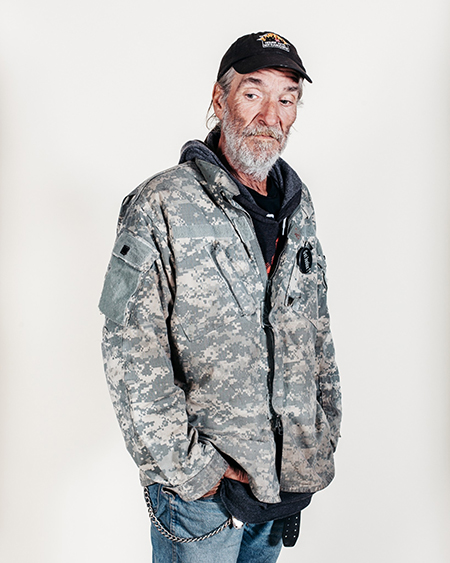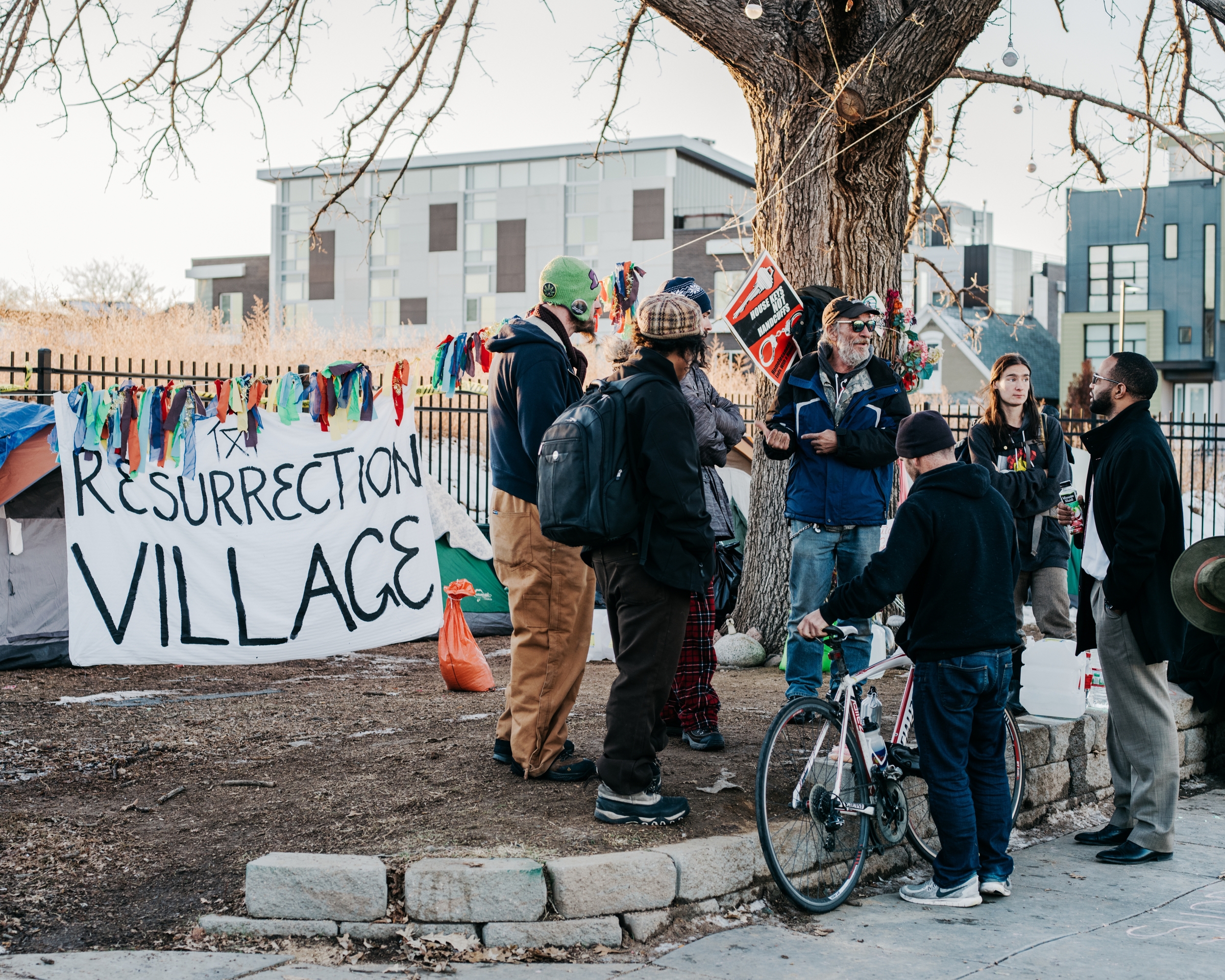Jailed for being homeless
Legislation to prevent tent cities and homeless encampments is increasingly popular in jurisdictions throughout the country. But what happens when people are jailed and fined for having no place to sleep?
A free daily email with the biggest news stories of the day – and the best features from TheWeek.com
You are now subscribed
Your newsletter sign-up was successful
This piece was produced for The Human Toll of Jail, a storytelling project of the Vera Institute of Justice in collaboration with Narratively, supported by the John D. and Catherine T. MacArthur Foundation's Safety and Justice Challenge.
On an overcast autumn morning, 21-year-old Joey Fiala sits on a sprawl of sleeping bags and blankets, watching Colorado's prolonged summer yield to winter. Fiala, originally from Kansas City, Missouri, is among a group of homeless people who gather most days in Jefferson Park on the north end of the Old Town Square section in Fort Collins. Here, a grassy lot sidles up to a busy railroad track and serves as a sort of daytime rest stop for folks without shelter. The men and women socialize and sneak catnaps in between hustling for cash and shuttling around the community to make use of its spread-out resources. When night falls, however, residents without shelter rush to get out of sight. Groups disperse and individuals head off in pairs or on their own.

Ray Lyall, 57, has been homeless for two years | (Benjamin Rasmussen/Courtesy Narratively)
The Week
Escape your echo chamber. Get the facts behind the news, plus analysis from multiple perspectives.

Sign up for The Week's Free Newsletters
From our morning news briefing to a weekly Good News Newsletter, get the best of The Week delivered directly to your inbox.
From our morning news briefing to a weekly Good News Newsletter, get the best of The Week delivered directly to your inbox.
Fort Collins, a college town at the base of the Rocky Mountain foothills, prohibits practices such as loitering, "misuse of public waters," and "camping or pitching a tent without permission." Being homeless here necessitates invisibility, and consequently, isolation. Things that offer safety and even comfort at night — tents or multi-person encampments — make hiding difficult, and often land homeless people in jail.
"I've been to jail twice for camping," Fiala says between swigs of coffee and bites of a doughnut, pulling his jacket tight around his small frame.
"I've been in for camping and for trespassing," chimes in Steve, who doesn't give his last name. A dad with a perfect goatee and cheeks rosy from the incoming chill, Steve hesitates to offer more. But others in the group nod in agreement.
"Yeah, I got ticketed twice for sleeping under the Linden Street Bridge," Fiala says, jumping back in. "I was sick, sleeping on a mattress under the bridge, and they woke me up and gave me a ticket. I balled it up and threw it in their face. ‘F — you! I'm not gonna pay that. I can't pay that.' So I ended up in jail for failure to appear."
A free daily email with the biggest news stories of the day – and the best features from TheWeek.com

Recent years have seen a surge of policing efforts throughout Colorado targeting those without shelter. Numerous communities have banned panhandling, camping, or sleeping in cars on public property. Loitering and trespassing laws prevent homeless individuals from having a safe place to rest — or options for washing up or using a bathroom. Violators face fines of $100 or more, an expense that quickly adds up for repeat offenders, landing many with warrants and, eventually, jail time. (Officials in Fort Collins have said they are looking into proposals that would allow people to sleep outside in certain places.)
According to the 2015 report No Right to Rest: Criminalizing Homeless in Colorado, more than half of the state's homeless population has been in jail for minor infractions.
Fiala has been homeless about three years, or pretty much his entire adult life. When he first moved to Fort Collins with his then-girlfriend, they slept in their car. "But," he sputters, in sequential bursts of frustration, "she cheated on me….She wrecked [our car]." He dunks a doughnut in his rapidly cooling cup of coffee and shudders. "You got a cigarette?"
Wes Hammond, a middle-aged man who has been listening quietly, suddenly plunges into the exchange. Hammond has been homeless on and off for much of his life. Born in Kentucky, he lived briefly in Tennessee before heading west. "I hitchhiked for three days to Colorado and this guy picked me up, asked if I wanted to work on a ranch," he says. "So I did, up in the mountains, but I got tired of that, so I built a bike and I rode it off that mountain."
He arrived in Fort Collins in 2010, initially finding stability in a relationship. When that "blew up" a year ago, he found himself back on the streets.
"I've had three camping tickets, two trespassing tickets, open container, parks violation, and urinating in public," he claims. "My fines come to $2,009….I just got out of jail last night. Just one night this time. Failure to appear. Tacked on a $50 fine." He takes a drag off the spliff that's been floating around the circle and shakes his head ruefully. "I won't be able to pay it. And all my stuff's there at the police station. I can't get to it."
Steve, eyeing the joint, chimes in once more. "You better be careful with that. We may be in Colorado, but our house doesn't have any walls," he says, referring to the state's legalization of marijuana use in private, but not in public spaces. As with open alcohol containers and intoxication, smoking cannabis is permitted only for those with the means to do so behind some sort of closed door. Individuals who lack shelter automatically miss out on key benefits afforded by seclusion. The very invisibility they seek when scattering at night is almost impossible to come by without the security of a safe and private place to rest.
Almost 70 miles away in Denver, it's a very different scene at a not-so-different park. On the night of October 24, 2015, a group of homeless individuals and their supporters planted themselves in Sustainability Park. Led by Denver Homeless Out Loud (DHOL), a grassroots activist organization, the volunteers had spent several days building "a tiny-home village to be occupied and managed by houseless people."
The U.S. Department of Housing and Urban Development estimated that nearly 10,000 Coloradans were homeless on a given night in January 2015. Advocates note that these point-in-time surveys — volunteers attempt to count individuals in shelters and on the streets on a single night — tend to result in drastic underestimates. The methods make it easy to "miss" those who are homeless short term, temporarily institutionalized, doubled-up with friends, not engaged with resources, or effectively hidden from authorities. However, the numbers do tell us that, while national homelessness has declined since 2013, in Colorado it has remained steady, even seeing a slight increase. More specifically, Denver's point-in-time data show a consistent upward trend in metro-area homelessness since 2011, from 3,007 to 3,978. According to the "No Right to Rest" report, "shelter beds are available for only about 10%" of Denver's homeless population.
Nonetheless, Denver and other jurisdictions across the state continue to propose bills and implement policies that make it more difficult to survive on the streets. Denver has not only banned camping but also the use of a variety of items for shelter, including tents, cardboard, and newspapers. In the midst of this citywide dearth of affordable housing, DHOL's tiny homes were designed to provide much-needed shelter. But when 70 police officers, including a SWAT team, descended, Resurrection Village quickly became a protest site.
Police confiscated the tiny homes and as people scattered, 10 were arrested, including DHOL volunteer Ray Lyall. Originally from California, Lyall moved to Colorado in the 1980s to be closer to family and get a fresh start. Now 57, he has been homeless since a botched construction deal two years ago left him unable to pay rent.
Read the rest of this story on Human Toll of Jail.
Narratively is an online magazine devoted to original, in-depth and untold stories. Each week, Narratively explores a different theme and publishes just one story a day. It was one of Time's 50 Best Websites of 2013.
-
 What to know before filing your own taxes for the first time
What to know before filing your own taxes for the first timethe explainer Tackle this financial milestone with confidence
-
 The biggest box office flops of the 21st century
The biggest box office flops of the 21st centuryin depth Unnecessary remakes and turgid, expensive CGI-fests highlight this list of these most notorious box-office losers
-
 The 10 most infamous abductions in modern history
The 10 most infamous abductions in modern historyin depth The taking of Savannah Guthrie’s mother, Nancy, is the latest in a long string of high-profile kidnappings
-
 'Once the best in the Middle East,' Beirut hospital pleads for fuel as it faces shutdown
'Once the best in the Middle East,' Beirut hospital pleads for fuel as it faces shutdownSpeed Read
-
 Israeli airstrikes kill senior Hamas figures
Israeli airstrikes kill senior Hamas figuresSpeed Read
-
 An anti-vax conspiracy theory is apparently making anti-maskers consider masking up, social distancing
An anti-vax conspiracy theory is apparently making anti-maskers consider masking up, social distancingSpeed Read
-
 Fighting between Israel and Hamas intensifies, with dozens dead
Fighting between Israel and Hamas intensifies, with dozens deadSpeed Read
-
 United States shares 'serious concerns' with Israel over planned evictions
United States shares 'serious concerns' with Israel over planned evictionsSpeed Read
-
 Police raid in Rio de Janeiro favela leaves at least 25 dead
Police raid in Rio de Janeiro favela leaves at least 25 deadSpeed Read
-
 Derek Chauvin's attorney files motion for new trial
Derek Chauvin's attorney files motion for new trialSpeed Read
-
 At least 20 dead after Mexico City commuter train splits in overpass collapse
At least 20 dead after Mexico City commuter train splits in overpass collapseSpeed Read